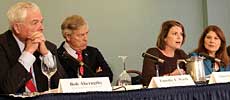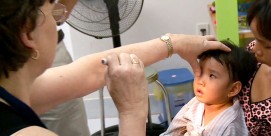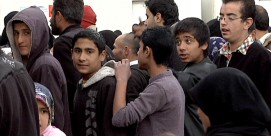Religion & Ethics NewsWeekly/UN Foundation Survey Explores Religion and America’s Role in the World
Americans See U.S. as Force for Good in the World,
But Say Sometimes the U.S. Causes More Harm than Good
Despite a divided view of America’s impact on the world, the vast majority of Americans believe the United States has a moral obligation to be engaged on the international stage, according to a new survey by Greenberg Quinlan Rosner Research Inc. for RELIGION & ETHICS NEWSWEEKLY and the United Nations Foundation.

Watch Excerpts from a Washington press conference with:
The September 2008 survey found that nearly a quarter of Americans (24%) say the U.S. should be very actively engaged in world affairs and 70 percent believe America should be at least moderately involved. Most believe the nation should be actively involved in world affairs because of an explicit responsibility or moral obligation to take a leadership role in the world. At the same time, nearly eight-in-ten (79%) of Americans agree that sometimes U.S. involvement in world affairs causes more harm than good. Overall, Americans are equally split about whether the U.S. has a positive or negative impact on the world.
“Americans remain very interventionist in their views about America’s role in the world and want the U.S. to take an activist role on the world stage,” according to University of Oklahoma professor Allen Hertzke, a visiting scholar at the Pew Forum on Religion and Public Life, in an interview with RELIGION & ETHICS NEWSWEEKLY. But, he added, “They want us to be smart about it.”
Sixty-eight percent of people who attend religious services at least once a week say America has a moral obligation to be involved in world affairs, compared to 54 percent of people who attend less frequently. Fifty-five percent of people who attend religious services every week say America’s influence in the world has been positive, compared with 44 percent of people who attend less frequently,
Americans view their country as a nation set apart from others. Most Americans believe God has uniquely blessed America (61% agree), and a similar number (59%) believe the US should set the example as a Christian nation to the rest of the world.
The findings are based on a national survey of 1,400 adults, including an oversample of 400 young evangelicals ages 18-29. The survey was conducted September 14-21, 2008, and has a margin of error of +/- 3.1 percent. The survey results and report are available on the RELIGION & ETHICS NEWSWEEKLY Web site at pbs-wnet-preprod.digi-producers.pbs.org/wnet/religionandethics and will be the basis for a two-part broadcast series on America’s role in the world and on the views of young evangelicals beginning October 24 (check local PBS listings).
Full Report (PDF, 666 KB)
Questionnaire (PDF, 168 KB)
Additional Key Findings:
• Eighty percent of people who attend religious services regularly believe that America is blessed by God and that America should set an example to the world as a Christian nation (77% agree). Only 48 percent of people who attend services less regularly agree that America is uniquely blessed by God, and 49 percent of them agree America should set an example as a Christian nation.
• A substantial minority of Americans (41%) say they consider America’s culture to be better than others, agreeing with the statement “our people are not perfect, but our culture is superior to others” (21% strongly agree).
• The most important foreign policy priority across the religious spectrum is controlling the proliferation of nuclear weapons (80% of Americans, 86% of white evangelicals, 82% of Catholics, and 76% of mainline Protestants extremely/very important). It is harder to find support for objectives that would require a significant, long-term investment of resources, such as improving the standard of living in developing countries (49% of Americans, 47% of white evangelicals, 45% of Catholics, and 47% of mainline Protestants extremely/very important) or promoting democracy in other nations (39% of Americans, 48% of white evangelicals, 38% of Catholics, and 36% of mainline Protestants extremely/very important).
• Evangelical Protestants express the greatest support for an interventionist role on the part of the U.S., while more moderate religious groups such as mainline Protestants and Catholics
take a less interventionist posture.
• Evangelicals and traditional Catholics are more likely to believe the US is a positive presence in the world (58% and 53% positive respectively) than liberal Catholics, mainline Protestants and Americans who attend religious services only irregularly (37%, 45%, and 44% positive, respectively).
• Young evangelicals have a broader definition of pro-life issues than older evangelicals. Sixty- three percent of young evangelicals (ages 18-29) agree that poverty, disease, and torture are pro-life issues, compared to 56 percent of older evangelicals.







